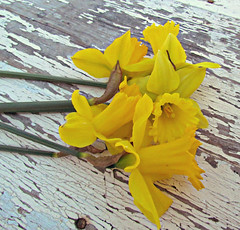I wandered lonely as a cloud
That floats on high o’er vales and hills,
When all at once I saw a crowd,
A host, of golden daffodils;
Beside the lake, beneath the trees,
Fluttering and dancing in the breeze.
Continuous as the stars that shine
And twinkle on the milky way,
They stretched in never-ending line
Along the margin of a bay:
Ten thousand saw I at a glance,
Tossing their heads in sprightly dance.
The waves beside them danced; but they
Out-did the sparkling waves in glee:
A poet could not but be gay,
In such a jocund company:
I gazed–and gazed–but little thought
What wealth the show to me had brought:
For oft, when on my couch I lie
In vacant or in pensive mood,
They flash upon that inward eye
Which is the bliss of solitude;
And then my heart with pleasure fills,
And dances with the daffodils.
All critics believe when they come to study this poem that Wordsworth is describing the flowers. Conventional criticism believe that while he was walking, he came to a bunch of daffodils. They believe that the poem is nothing more than a description. However, I believe that Wordsworth did not meet the daffodils when he wrote this poem, a good poet doesn’t need to see the daffodils to write about them.
In his “Preface to Lyrical Ballad” he says that a poet is not in need for external stimulus so that he could write a poem. This means that whenever we meet a poem, we shouldn’t understand that the poem is the product of a certain definite occasion. Wordsworth may have seen but also he could write the poem even if he didn’t see the daffodils. He can write with or without a stimulus. Seeing the daffodils or not is an external factor and shouldn’t be considered in evaluating the poem. This has nothing with the evaluation of the poem. The first impression about the title is that the first lines would be about the daffodils. In this case it will appear that Wordsworth is describing the daffodils. This is not the function of poetry because Wordsworth say that poetry is the “Spontaneous overflow of powerful feelings recollected at tranquility”. So, the lines are not about the daffodils, and even if they are, the poet is not reproducing nature. The purpose of poetry is never to imitate nature, because if it is an imitation, then it wouldn’t be poetry according to Wordsworth. This is what is conveyed in his preface. “Poetry has no purpose, if there is a purpose, it should be a worthy one”. There are two contradictory cases, either poetry has a purpose or not. If poetry has a purpose, then Wordsworth would be describing, but as proved in the lines, he is not describing the flowers. The worthy purpose is not describing the daffodils, so there is another story behind the title. Continue Reading: Romantic Era: A Critical View on William Wordsworth’s poem “The Daffodils”




Pingback: What makes a poem a poem? | Write on the World
Pingback: Find your Voice in Writing. | lifetimeofpoetry
Pingback: Poem for Kris | Reason & Existenz
I like your work because your material aware all students
NICE
Great information. really helped me a lot
Knowleagble
Informative article thanks for sharing it
i love dis poem
also one of my favourite poems……
I expect many and many information on Romantic and other movements in English Literature through this link
Sure I will be adding more information and articles on various poets and poetic eras
Thanx 4 uploading this wonderful mastery of William Sir. Would love 2 se more of him. 🙂
I like this poem so much
It gives ;more and more about William Wordsworth
A wonderful poem. I really like it.
But in this case there is of course an external stimuli..as the image of daffodils is also there in Dorothy’s journal..and true that he said..”poetry is emotions recollected n tranquility” so there got to be some definite pre-experience to be recollected, which he here is reflecting in his solitude..there’s a definite role of memory on some substantiated past experience. here some psychosomatic experiences are narrated in a metrical form.
William Wordsworth repeatedly described all good poetry as, at the moment of composition, “the spontaneous overflow of powerful feelings.” Thus, he located the source of a poem not in the outer world, but in the individual poet, and specified that the essential materials of a poem were not external people and events, but the inner feelings of the author, or at any rate, external objects only after these have been transformed or irradiated by the authors feelings. But to Wordsworth, although the composition of poem originates from “emotion recollected in tranquility,” and maybe preceded and followed by reflection, the immediate act of composition must be spontaneous-that is, arising from impulse, and free from all rules and the artful manipulation of means to foreseen ends-if the product is to be a genuine poem. Please check my article “Are the Romantic Poets, Poets of Nature”.
very nice poem….
really very helpful notes…tahnx for uploding
really good . it helped me a lot .
very good
It is a very powerful poem
yup its a good poem
good